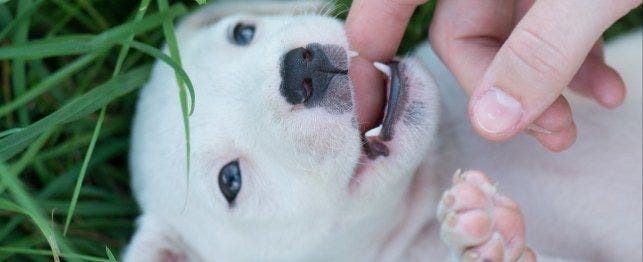
Why Puppies Bite and How to Stop It
When you bring home a new puppy, you’ll be overcome by its adorable melting eyes and small wiggly body. Most people get swept away by their puppy’s cute and snuggly nature. But after a few weeks, something strange starts to happen, your puppy starts biting you!
Oh no, did you do something wrong? Was he separated from his mother too soon and is now lashing out? Have you not show her enough love and attention? The answer is “none of the above.”
Puppy biting is entirely normal and natural. Dogs and puppies use their mouths to interact with their environment since they don’t have fingers like humans do. Puppies are adorable little descendants of wolves, and their teeth are what they use to explore the world around them. Their teeth were once used as weapons, and they must use them to learn what they can and cannot do. So while it may be startling when this behavior first starts, it is in no way a reflection of your puppy parenting skills.
Why Do Puppies Bite When They Play?
Puppies love to play-bite, and it’s their way of investigating. When puppies play with one another, they can learn about their strengths and what they can do with their teeth and jaws. Puppies have sharp puppy teeth that they use to learn their abilities and then learn to constrain their force of bite before their dog teeth grow in. Then, as they grow, they will have a safe tool to eat, and solve conflicts with if necessary.
Puppies are not like children. You would never hand a toddler a sharp object and say “Now be careful with that Timmy. You could hurt yourself or someone else.” You would most likely wait until the child is older before trusting them with a potentially dangerous item. But puppies come into their own type of dangerous special items very early in life. Puppies need to learn from the very beginning how they can and cannot use these natural weapons.
When Do Puppies Stop Biting?
Puppies stop biting when they are taught that human skin is sensitive. Sound too simple to be true? Well, it is a bit harder than that. Bite inhibiting behaviors can be taught by a human or by playing with other dogs. Bite inhibition and bite training is a part of puppy behavioral development. It can go along naturally with house and trick training, but the most important lessons will be taught to your puppy from its brothers and sisters while still with their litter.
By socializing and nursing, your dog will learn bite inhibition. Puppies will play bite and discover that their teeth hurt by yelping and discontinuing play. When puppies nurse, their mother will teach them bite inhibition by walking away after being bitten.
As they grow and learn what their teeth and jaws are capable of, they can learn to control their biting for what they need to do. When puppies are taught that play biting is ok, they will continue to do it. But, if they are taught that any kind of bite hurts and/or is not nice, they will stop. Dr. Dunbar believes that bite inhibition is one of the most important things a dog can learn. Bite inhibition can be taught in 3 months to a newborn puppy, and it should ideally be reinforced throughout their lives.
How to Get Your Puppy to Stop Biting
During socialization, if nipping or biting occurs, playtime often stops. Training your puppy to know that playtime is over if biting happens is a good way to teach bite inhibition. If biting happens, it is best to say, “Ow!” in a sharp and high pitch, mimicking the sound of their brother and sisters yelping. Then, pull your hands away and look away, or even walk away, reinforcing that if biting happens, playtime ends. Read this very useful article by Dr. Nick Dodman on Nipping and Mouthing of Pups.
It is important to understand that as bite inhibition training begins, the first step is to teach them to inhibit the force of their bite. If the puppy is taught to never put his mouth on you, then when it does, he won’t know his strength or that your skin is fragile. As you practice, the puppy will use a smaller amount of pressure each time, and it will become less frequent over time.
More Tips on Raising a Puppy
A lot of work goes into raising a puppy. You’re probably full of questions about what you should and should not do with your new puppy; so we’ve compiled some of our most popular beginner puppy articles to get you started:
- Raising a Normal Healthy Puppy
- Guide to Behavior Problems in Dogs
- What Not to Do With Your New Puppy
- 12 Things every Puppy Owner Should Know
- Puppy Vaccinations: What to Expect
These articles are just a starting point. Just like with raising a human child, you’ll never be done learning when it comes to raising your puppy. We hope that we’ve helped you to understand more about puppy biting, why it happens, and how to stop it. Make sure you check out our puppy archive to stay up to date on all of our latest puppy tips and tricks.